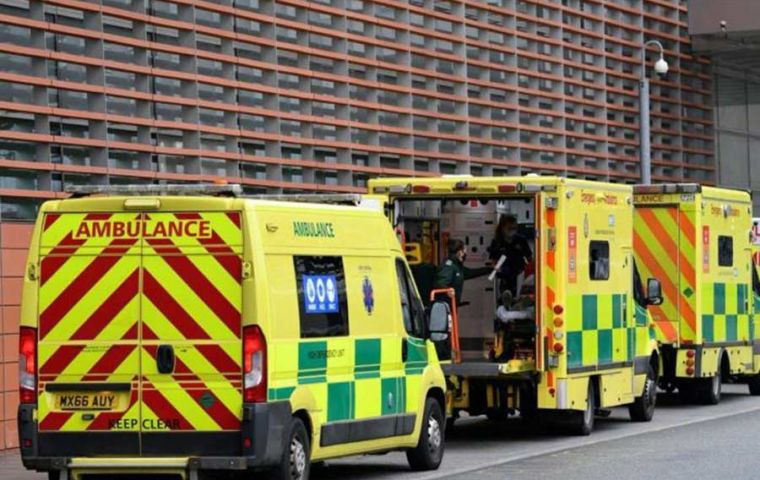MercoPress. South Atlantic News Agency
Disease outbreak in UK among children: acute hepatitis of unknown etiology
 As of 8 April, further investigations across the United Kingdom have identified a total of 74 cases (including the 10 cases) fulfilling the case definition
As of 8 April, further investigations across the United Kingdom have identified a total of 74 cases (including the 10 cases) fulfilling the case definition On 5 April 2022, the International Health Regulations (IHR) National Focal Point (NFP) for the United Kingdom notified WHO of 10 cases of severe acute hepatitis of unknown etiology in previously healthy young children (age range: 11 months to five-year-old) across central Scotland.
Of these 10 cases, nine had onset of symptoms in March 2022 while one case had an onset of symptoms in January 2022. Symptoms included jaundice, diarrhea, vomiting and abdominal pain. All 10 cases were detected when hospitalized.
As of 8 April 2022, further investigations across the United Kingdom have identified a total of 74 cases (including the 10 cases) fulfilling the case definition. The clinical syndrome in identified cases is of acute hepatitis with markedly elevated liver enzymes, often with jaundice, sometimes preceded by gastrointestinal symptoms, in children principally up to 10 years old. Some cases have required transfer to specialist children’s liver units and six children have undergone liver transplantation. As of 11 April, no death has been reported among these cases and one epidemiologically linked case has been detected.
Laboratory testing has excluded hepatitis type A, B, C, and E viruses (and D where applicable) in these cases while Severe acute respiratory syndrome coronavirus type 2 (SARS-CoV-2) and/or adenovirus have been detected in several cases. The United Kingdom has recently observed an increase in adenovirus activity, which is co-circulating with SARS-CoV-2, though the role of these viruses in the pathogenesis (mechanism by which disease develops) is not yet clear. No other epidemiological risk factors have been identified to date, including recent international travel. Overall, the etiology of the current hepatitis cases is still considered unknown and remains under active investigation. Laboratory testing for additional infections, chemicals and toxins is underway for the identified cases.
Following the notification from the UK, less than five cases (confirmed or possible) have been reported in Ireland, further investigations into these are ongoing. Additionally, three confirmed cases of acute hepatitis of unknown etiology have been reported in children (age range 22-month-old to 13-year-old) in Spain. The national authorities are currently investigating these cases.
Clinical and public health response has been implemented across the United Kingdom to coordinate case finding with investigation into the cause of illness in these cases.
Further investigations by the national authorities are ongoing to include more detailed exposure history, toxicology testing, and additional virological/microbiological tests. Guidance has been issued to experts to support a thorough investigation of suspected cases.
Further investigations and a clinical and public health response to the cases reported are also being undertaken in Ireland and Spain.
The United Kingdom has reported a recent unexpected significant increase in cases of severe acute hepatitis of unknown etiology in young children. Although the potential role of adenovirus and/or SARS-CoV-2 in the pathogenesis of these cases is one hypothesis, other infectious and non-infectious factors need to be fully investigated to properly assess and manage the risk.
As there is an on-going increasing trend in cases in UK over the past month together with more extensive case searching, it is very likely that more cases will be detected before the etiology has been found (either biological, chemical or other agent(s)) and corresponding appropriate control and prevention measures have been taken.
WHO is closely monitoring the situation with other Member States and the United Kingdom and partners for cases with similar profiles.
Further work is required to identify cases both inside the United Kingdom and internationally. The priority is to determine the etiology of these cases to guide further clinical and public health actions. Any epidemiological links between or among the cases might provide indications for tracking the source of illness. Temporal and geographical information of the cases, as well as their contacts should be reviewed for potential risk factors.
Finally, WHO does not recommend any restriction on travel and/or trade with the United Kingdom, or any other country where cases are identified, based on the currently available information.




Top Comments
Disclaimer & comment rulesCommenting for this story is now closed.
If you have a Facebook account, become a fan and comment on our Facebook Page!